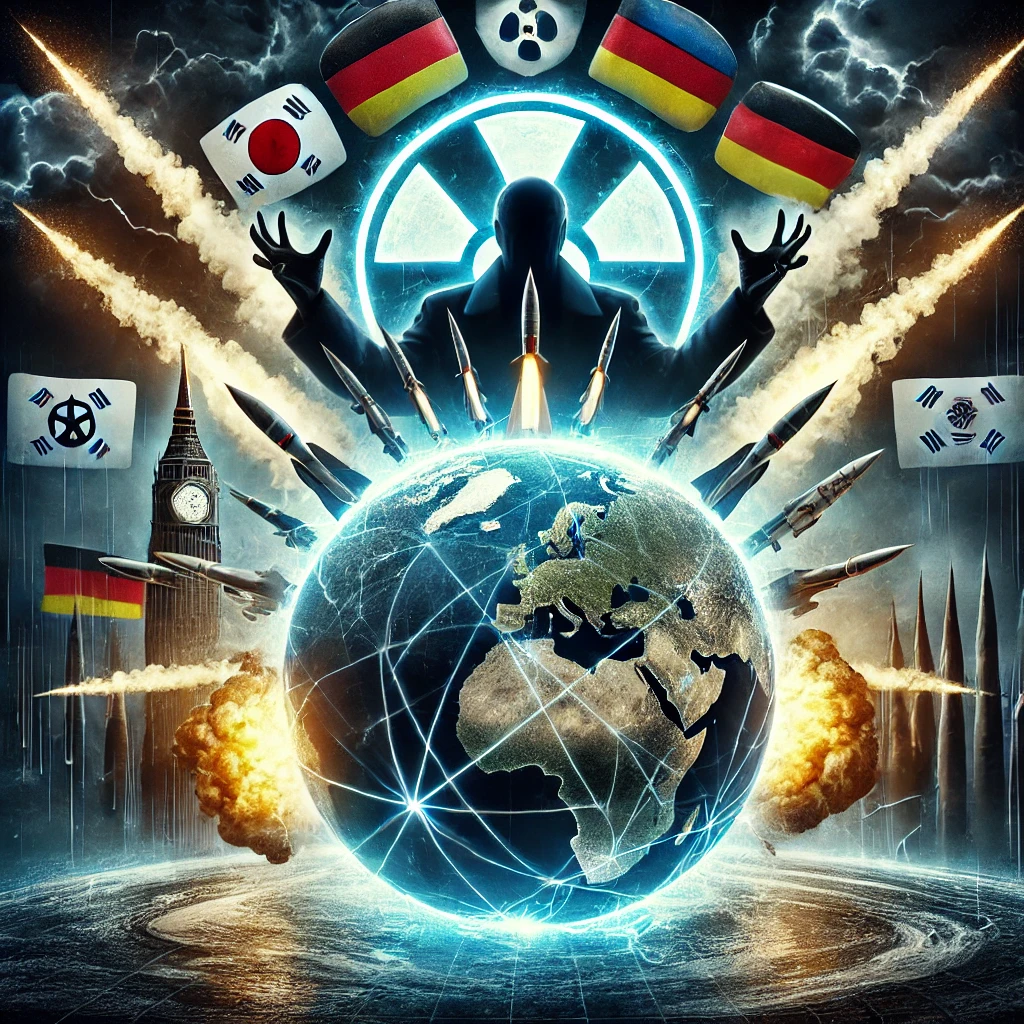Add Your Heading Text Here
📅 Published: March 24, 2025 ✍️ By: Global World Citizen International Desk 🔗 Source: 🌐 GlobalWorldCitizen.com
As U.S. President Donald Trump reclaims global attention, his pivot away from traditional alliances and nuclear assurances is fueling renewed fears of a global nuclear arms race—one that could fracture decades of stability and thrust the world into a dangerous new era.
During the Cold War, despite deep rivalry, the U.S. and the Soviet Union agreed on one foundational truth: unchecked nuclear proliferation posed a catastrophic risk to all of humanity. The result was the 1968 Non-Proliferation Treaty (NPT), a pact to curb the spread of nuclear weapons and keep nuclear states limited to single digits.
Now, decades later, that consensus is unraveling.
 A Fragile Peace Under Threat
A Fragile Peace Under Threat
Under the NPT, only five states—the U.S., Russia, China, France, and the U.K.—are recognized as official nuclear powers. Yet additional countries, including India, Pakistan, Israel, and North Korea, have entered the nuclear club outside this framework. For years, U.S. security guarantees under its nuclear umbrella discouraged further spread.
But Trump’s sharp rebuke of NATO, warming ties with Moscow, and questioning of long-standing defense commitments have left key allies—including Germany, Poland, South Korea, and Japan—wondering: Can they still count on Washington?
“The Trump phenomenon has provided a powerful accelerant for voices in U.S.-allied states who now see nuclear weapons in their own hands as the only guarantee,” said Ankit Panda of the Carnegie Endowment.
 Germany: A Once-Unthinkable Debate
Germany: A Once-Unthinkable Debate
Germany, a long-time U.S. ally and a champion of post-war peace, is now engaged in a dramatic public conversation: Should it develop its own nuclear capability?
Chancellor-in-waiting Friedrich Merz raised the idea of seeking nuclear security from the U.K. and France, triggering heated debate. While Germany hosts about 20 U.S. nuclear bombs at Büchel air base, some officials privately question whether that deterrence can last.
“A German nuclear program would provoke a storm from Russia, Poland, and others,” warned former ambassador Wolfgang Ischinger.
 Poland: A Rising Voice for Nuclear Defense
Poland: A Rising Voice for Nuclear Defense
In Poland, Prime Minister Donald Tusk has broken new ground, suggesting nuclear sharing with France—or developing Poland’s own deterrent. President Andrzej Duda even proposed relocating U.S. warheads to Polish soil, a provocative idea rejected by past U.S. administrations.
Still, analysts agree Poland lacks the nuclear infrastructure, technology, and time to go solo. Instead, Poland eyes a possible European nuclear consortium, should the NPT framework collapse.
 South Korea: “We Must Prepare for All Scenarios”
South Korea: “We Must Prepare for All Scenarios”
Facing North Korea’s growing nuclear arsenal and Trump’s unpredictable diplomacy, South Korea is rethinking its future. While not yet advocating open nuclear armament, many in Seoul are now calling for “nuclear latency”—the infrastructure to quickly weaponize if needed.
“Support for South Korea acquiring its own nuclear weapons is broadening and hardening,” said Dr. Sangsin Lee, a researcher at a state think tank.
South Korea’s technological capability is unquestioned. Experts believe the country could develop a basic nuclear weapon in two to three years—if it chose to.
 Japan: From Peace Clause to Nuclear Threshold?
Japan: From Peace Clause to Nuclear Threshold?
As the only nation to have suffered nuclear attacks, Japan’s anti-nuclear stance runs deep. But North Korea’s missiles, China’s rise, and Trump’s America have quietly reignited strategic concerns.
Japan’s significant plutonium reserves and advanced engineering base give it the technical capability to build weapons quickly. Yet doing so would mean crossing profound political and cultural lines.
“For now, Japan hugs the U.S. tightly. But Plan Z—building nuclear weapons—is no longer unthinkable,” says Dr. Stephen Nagy, Tokyo-based political analyst.
 What This Means for Global World Citizens
What This Means for Global World Citizens
The unraveling of the nuclear non-proliferation consensus is not a regional issue—it is a global red alert. If even a few more nations go nuclear, the fragile web of peace that has held since the Cold War could snap, ushering in a new era of nuclear brinkmanship.
From Berlin to Tokyo, Warsaw to Seoul, the rise of nuclear nationalism is not just a local or national concern—it is a defining issue for Global World Citizens everywhere.
 A Call for Global Unity & Action
A Call for Global Unity & Action
At GlobalWorldCitizen.com, we believe the answer is not more bombs—but more diplomacy, more global governance, and more citizen engagement. Now is the time for an urgent global dialogue on disarmament, deterrence, and peace.


